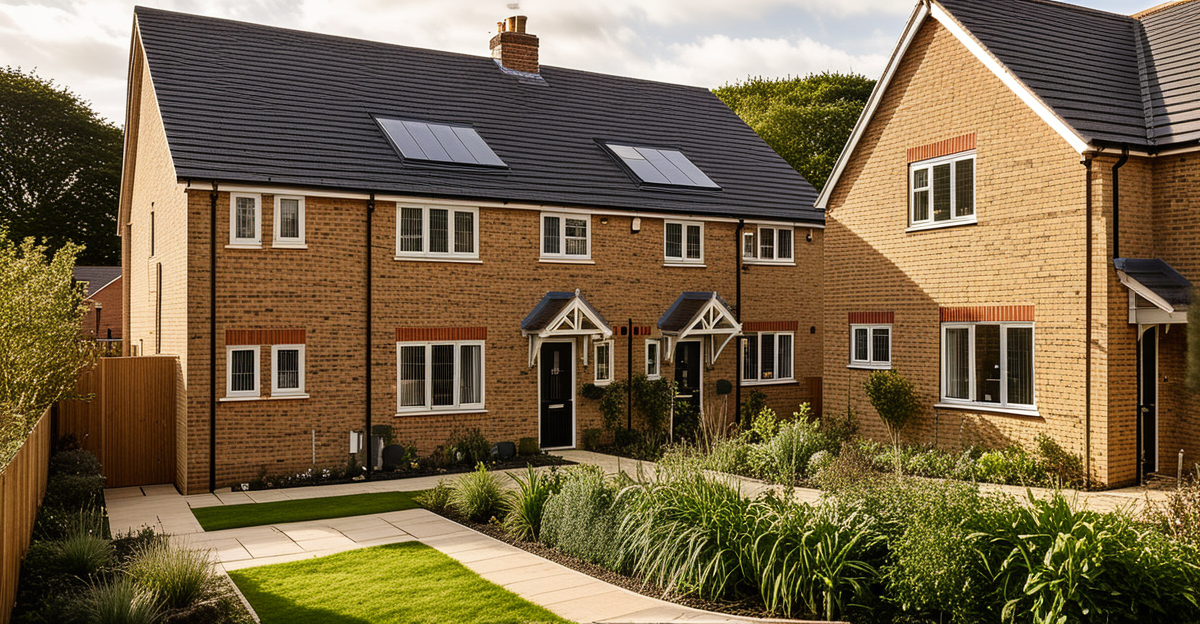Introduction to Sustainable Housing Finance Trends
The concept of sustainable housing finance is gaining prominence in the UK, driven by the need for environmentally friendly and energy-efficient building practices. This form of financing focuses on supporting projects that reduce carbon footprints and promote eco-friendly living conditions. As the housing market continues to evolve, understanding the emerging trends in sustainable housing finance becomes imperative for stakeholders, including developers, investors, and policymakers.
Currently, the UK housing market is witnessing a shift towards sustainability, propelled by societal demand for greener living spaces and regulatory incentives. Trends such as the adoption of green technologies, net-zero housing initiatives, and sustainable materials sourcing are reshaping the landscape. For stakeholders, staying informed about these trends is crucial as they significantly influence investment decisions and project feasibility. Recognising the importance of sustainable housing finance, various initiatives and policies are being crafted to facilitate easier access to funding for eco-friendly projects, thereby making sustainability a viable and attractive option for future developments.
Also to read : What Are the Future Trends for UK Real Estate Investments?
Recent Developments in Policy and Regulation
In the UK, housing policy and regulations are pivotal in shaping sustainable finance strategies. These government initiatives are designed to promote environmentally conscious building practices and increase access to sustainable housing finance options. By focusing on reducing the carbon footprint of new constructions and retrofits, these policies aim to make a significant environmental impact while offering developers attractive incentives.
Recent regulatory changes have broadened the financing options available for sustainable housing investments. The updates include tax incentives for developers who incorporate green technologies and initiatives into their projects, alongside grants and low-interest loans specifically for eco-friendly housing developments. The shift in policy also requires compliance with stricter energy efficiency standards, thereby ensuring that sustainable practices are institutionally embedded within the industry.
Also to see : How Can Real Estate Trends Impact Financial Markets in the UK?
The impact of these regulatory changes is profound. They not only bolster investor confidence but also provide clear guidelines and frameworks within which developers must operate. As a result, investment in sustainable housing has become progressively appealing, fostering an environment where more innovative and eco-conscious projects can thrive.
Innovative Financing Models
Innovative financing models are playing a transformative role in advancing sustainable housing finance. With a spotlight on both traditional and novel approaches, these models are increasingly focusing on aligning economic viability with environmental sustainability.
Green Bonds and Their Role
Green bonds have emerged as a prominent financing tool for eco-friendly projects, offering a unique opportunity for investors to support environmental initiatives while seeking returns. They are securities designed specifically to raise funds for projects with positive environmental benefits, such as renewable energy developments and sustainable housing projects. By providing capital specifically tied to sustainability criteria, green bonds encourage a more transparent and credible commitment to environmental responsibility among issuers.
Crowdfunding for Housing Projects
Crowdfunding platforms are gaining traction as an accessible means to fund sustainable housing projects. These platforms enable a large number of individuals to contribute small amounts of money towards funding real estate developments, democratizing the investment process. For sustainable housing, crowdfunding offers the dual benefit of community engagement and the flexibility to innovate without the constraints of traditional financing. By harnessing the power of collective contributions, crowdfunding makes it feasible to pursue ambitious eco-friendly housing initiatives that might otherwise struggle to secure funding.
Public-Private Partnerships
Public-private partnerships (PPPs) represent a collaborative approach wherein public sector entities and private companies join forces to finance and execute sustainable housing projects. These partnerships leverage the strengths of both sectors—public oversight and private efficiency—to deliver housing developments that meet stringent sustainability criteria. Successful case studies, such as mixed-use developments that emphasize green building practices, illustrate the potential of PPPs to achieve both profitability and environmental goals. Through shared risks and rewards, PPPs foster innovation and scalability in the housing sector.
Case Studies of Successful Sustainable Housing Projects
Delving into case studies reveals significant lessons and best practices from successful sustainable housing projects in the UK. By analyzing these projects, we can identify the factors leading to their financial and environmental success, offering valuable insights for future developments.
One renowned project is BedZED, the UK’s first large-scale mixed-use eco-community. Its success stemmed from integrating renewable energy sources and sustainable transportation, achieving a substantial reduction in carbon emissions. This project illustrates the importance of comprehensive planning and cross-industry collaboration.
Another noteworthy case study is the Brighton Waste House, built using around 90% waste materials. This innovative approach not only minimized construction waste but also demonstrated the potential for using sustainable materials effectively. The financial viability here was enhanced by reduced material costs, setting a precedent for cost-effective green building practices.
Through these examples, we see the impact of adopting cutting-edge sustainability practices. Each project teaches crucial lessons: prioritizing sustainability from inception boosts project appeal and economic viability, while fostering community buy-in ensures long-term success. These principles guide stakeholders in developing financially successful and environmentally friendly housing.
Market Forecasts and Future Trends
In exploring the market forecasts and future housing trends, it’s essential to consider the evolving landscape of sustainability in the UK housing sector. Analysts predict significant growth in sustainable housing finance driven by societal and regulatory demands. This growth reflects an increasing emphasis on eco-friendly building practices, where financial incentives and technological advancements interact to shape the future.
Emerging trends show a keen focus on integrating smart technology to enhance energy efficiency and reduce carbon emissions. For instance, the incorporation of advanced monitoring systems in homes is expected to transform how energy is consumed and managed. These technologies not only cut costs but also improve a property’s ecological footprint, making them a cornerstone of future sustainability efforts.
The role of impact investing will also become more pronounced, as investors seek opportunities that align financial returns with positive environmental impact. A shift towards responsible investment strategies is encouraging more stakeholders to support projects that prioritize sustainability goals. This is further reinforced by the introduction of government incentives aimed at making eco-friendly housing a more attractive investment proposition.
Overall, understanding these future trends is pivotal for stakeholders wishing to capitalize on the opportunities within the sustainable housing market. By staying informed and adapting to new technologies and policies, developers and investors alike can navigate the challenges and leverage the potential that sustainable housing finance presents.
Expert Opinions and Commentary
In the landscape of sustainable housing finance, industry leaders and thought provokers provide invaluable insights. These experts emphasize the need for innovative solutions and proactive policies in addressing the challenges faced by the UK housing market. Their commentary often underscores the importance of adopting forward-thinking strategies and embracing emerging technologies to achieve sustainability goals.
Perspectives on Future Trends
Leading voices in the field highlight the anticipated growth in sustainable housing finance, driven by increased regulatory pressures and societal demands for eco-friendly housing. According to prominent experts, the integration of smart technology and renewable energy sources will be pivotal in transforming the housing market. They suggest that sustainability efforts should focus on enhancing energy efficiency and reducing carbon emissions, which are critical components of future development plans.
Importance of Continued Discussion
Encouraging dialogue among stakeholders is crucial in navigating the evolving market and legislative environment. Many experts advocate for ongoing discussion to foster collaboration and innovation. These discussions can bridge gaps between policymakers, developers, and investors, enabling a shared understanding of the challenges and opportunities in the sector.
Role of Policymakers
Thought leaders emphasize the significant role of policymakers in shaping the future of green finance. By crafting supportive regulations and incentives, governments can lead the charge toward more sustainable building practices. Experts argue that such policies are essential for creating a conducive environment where sustainable housing initiatives can thrive.
Understanding these expert insights and engaging in continuous dialogue are vital for advancing the sustainability agenda in the housing sector. This collective effort will be instrumental in shaping a resilient and environmentally sound future for the UK housing market.
Resources and Further Reading
In the burgeoning field of sustainable housing finance, comprehensive resources are essential to guide stakeholders. With a rapid evolution in policies and technologies, these resources provide critical insights and tools to navigate the complex landscape.
Government Reports and Publications
Government reports are invaluable for understanding the regulatory framework and incentives available for sustainable housing. These documents outline specific programs and criteria that developers and investors must comply with, offering detailed guidance on accessing government support for sustainable initiatives. By staying updated with these publications, stakeholders can ensure they adhere to evolving policies and maximize available benefits.
Academic Research on Housing Finance
Academic research plays a crucial role in shaping innovative strategies in sustainable housing finance. Scholars conduct studies that delve into the economic and environmental impacts of various financing models and building practices. These studies provide data-driven insights and predictive analyses that help identify successful approaches and areas requiring further exploration. Engaging with academic literature can enhance strategic planning and decision-making for stakeholders.
Industry Guides and Toolkits
Industry-specific guides and toolkits are practical resources that offer tailored strategies and best practices for implementing sustainable housing projects. These tools are designed to assist in project planning, from the initial assessment of ecological impact to securing appropriate financing. By utilizing these guides, developers and investors can streamline processes and improve outcomes in sustainable housing endeavors.
By leveraging these resources, stakeholders can gain a comprehensive understanding of sustainable housing finance, empowering them to make informed, strategic decisions in the pursuit of eco-friendly development.



